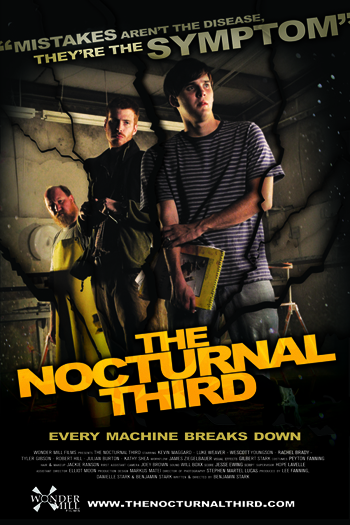
BENJAMIN STARK – WRITER/DIRECTOR
There seems to be a stigma attached to day jobs in the indie filmmaking community. Oftentimes, it comes across as a shameful burden that keeps the indie filmmaker from creating freely; almost as if having a day job means you aren’t a “real” filmmaker yet. Other times, it seems that as long as you’re working in the industry, you’re doing okay. For example, let’s say you want to be a director. The mentality seems to be that if you’re working in the film industry somehow in a non-directing capacity, you’re working toward your goal, but if you’re working any old day job at Barnes & Noble or Coldstone Creamery, you’re doing something wrong. This is an unfortunate line of thinking. If you’re not directing, you’re not directing, no matter what your proximity to actual directors. We live in an age where your craft is limited not by social, economic, or geographic circumstances, but by your own unwillingness to pursue it.

Photo credits to VisiblePulse, Troy Fuqua, Gilbert Stark, and Laura Albyn
In my experience, I always structured my “career” as a writer/director as an eventual escape from the need for a day job. In college, I was fortunate enough to meet some really great friends, and we built a bit of a filmmaking community, making short films with shared cast and crew. The goal for life after college was to re-create the same community in my hometown, get a staff job somewhere, and work towards building that community into a kind of film production company. It was almost a LucasFilm kind of model, where those of us in Wonder Mill Films would be renegades, financing and producing our films on the outskirts of culture.
.jpg)
Photo credits to VisiblePulse, Troy Fuqua, Gilbert Stark, and Laura Albyn
Of course, just sharing this plan now shows exactly how naive I was those few short years ago. That said, some of the plan did work out as I had hoped; I secured a full time editing gig at a small ad agency, but it wasn’t well integrated into my life style as a filmmaker. My attempts at creating a community essentially failed, and I felt like my new job was a threat to my projects. The job wasn’t technically challenging, but it did help me work under pressure and in conflicted, awkward situations: Two intensely valuable qualities for a filmmaker to have. Looking back, I’m very thankful I had the work, as it gave me a simple and structured job that generated income to help pay for expenses on two feature films.

Photo credits to VisiblePulse, Troy Fuqua, Gilbert Stark, and Laura Albyn
Coincidentally, about six months after wrapping production on our second feature and my debut as writer/director, THE NOCTURNAL THIRD, the ad agency I was working for shut down. It was a shock, and although it had helped keep me stable during a few very unstable years of film production, now I was on my own. I had to take care of my wife, our condo, and our dog, so I worked as hard as I could to become a freelance media producer. Essentially, I had been forced into becoming what I thought I wanted to be – an all-purpose visual storyteller, whose company dabbles in video production, but focuses on monetized narrative filmmaking. Of course, that didn’t happen, and the whole process of my plan failing to come to fruition taught me a valuable lesson about exactly what my skills were, and how they needed to be directed.

A Genesis Found – Photography by Sam Hernandez, Design by Jessica Twilbeck
At that point, I needed to be focusing all of my creative energies on editing THE NOCTURNAL THIRD, but I found myself spending most of my unpaid time looking for clients, invoicing clients, and scheduling clients. This was my new day job, and when I wasn’t trying to drum up the work I sorely needed, I was considering every new idea as a potential revenue stream, rather than a story I needed to tell. Slowly, I was turning the audience into a customer, and I think that is one of the biggest threats to indie directors today: The poisoning of creativity by a desire to monetize. I was spending tremendous amounts of time on research: How to build an audience, how to market films, whether or not a web series was viable… Tying to figure out how to create revenue. Now, if you are a producer, then of course your job is to balance art and commerce; however, the person that generates projects and has to function as a creative work horse can’t let inspiration start from a marketing perspective. How can we complain about Hollywood executives churning out brand-based “properties” like prequels, remakes, and reboots when our motivation as indie filmmakers is exactly the same? Unfortunately, I was allowing that to happen. Fortunately, on the other hand, I was so busy editing THE NOCTURNAL THIRD that I couldn’t implement any of these projects! Again, the biggest danger of a writer/director forcing their craft into a day job is that the audience becomes a customer.

The Nocturnal Third – Photography by Stephen Lucas, Design by Jessica Twilbeck
This is when I realized my goal of a Lucas-type indie film magnate was severely misguided. I was not a mini studio head, I was a director… and my films needed to dictate how time was spent, not my company. So, as soon as I ditched freelancing and got another full time editing job, we were able to start shifting Wonder Mill to fit the needs of our art, rather than the other way around. So, ironically, the day job swooped in to make the save. Not only did it give me the stability and cash to keep editing, but it allowed me to grow as a technician. I really can’t say enough great things about the gig I’m in now, as my employers have provided with a ton of great skills, equipment, and freedom to grow at my own pace. Heck, they even took us to see PROMETHEUS, on the clock, which is just about the coolest thing I can imagine.
So, because I’m not spending valuable money-making energy on generating projects and satiating a customer base, I can focus my passions on whichever projects I have on my plate. Currently, we’re running a Kickstarter campaign, trying to raise money to take our two feature films on the road, and to submit them to Netflix, Hulu, and iTunes using Distribber. When that’s wrapped up on June 23rd, I’ll be able to focus my non-work energy on developing our third feature film, without the fear of being influenced by marketing considerations. While I would certainly always encourage a writer or director to start a project with distribution in mind, I don’t think it’s wise to lead with that.
Of course, as Scottish indie filmmaker David P. Baker has said, everyone has to take a different road. There certainly are no wrong ways to make films. However, chances are that if you’re reading this, filmmaking is not your primary vocation, and I’m here to tell you that you’re not cursed. The day job is not something to be escaped. Day jobs – along with vague notions of marriage, children, religion, financial responsibility, exercise, and diet – are often pegged as threats to filmmaking, but they aren’t. You are the threat. Like everything else in the life of an indie filmmaker, the day job is a tool. It’s up to you to discover how it can be wielded to get your film made.

Photo credits to VisiblePulse, Troy Fuqua, Gilbert Stark, and Laura Albyn
If you’d like more info on our Kickstarter campaign, WONDER MILL FILMS: FROM THE SOUTH TO YOUR COUCH, you check us out on Twitter (@WonderMillFilms), Google “Wonder Mill Kickstarter” or click on the banner at thenocturnalthird.com.
BIO:
Benjamin Stark is the writer and director of The Nocturnal Third.
Ben was born in Heilbronn, Germany, before his family emigrated to Huntsville, Alabama in 1987. He graduated from the University of Alabama in 2006, formed Wonder Mill Films with Lee Fanning in 2007, and has directed seven shorts and one feature film. Wonder Mill Films is currently developing their third feature film, to be written by A Genesis Found writer/director Fanning and directed by Stark. During development, the group will also be producing short film projects and working on a Southern roadshow. If you are looking to connect with Wonder Mill Films, e-mail wondermillfilms [at] yahoo.com or find them on Twitter (@WonderMillFilms) or Facebook.
Check out Ben’s other Film Courage post ‘DO WHAT YOU CAN WITH WHAT YOU HAVE: THREE LESSONS FROM THE NOCTURNAL THIRD.’
and ‘THEY GROW UP SO FAST: FINDING A HOME FOR OUR FILMS.’
Also check out ‘Down the Lost Highway: Why I Toured My DIY Feature Through the American South’ by fellow Alabama filmmaker Lee Fanning, which mentions Ben.

























